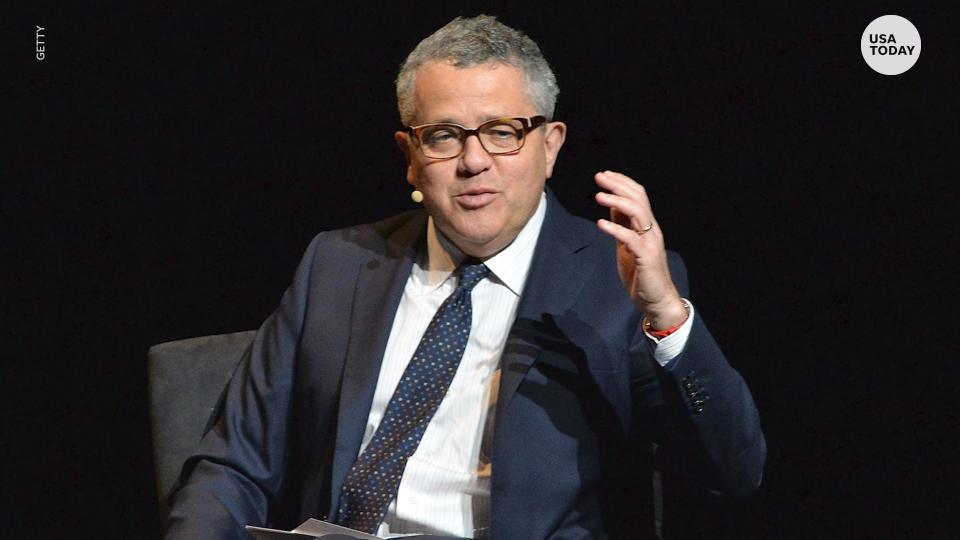The problem with Jeffrey Toobin's apology
CNN legal analyst Jeffrey Toobin returned to the network Thursday after being fired from his job at the New Yorker last fall for masturbating on a Zoom call with his co-workers. His first act back was to apologize to the public, his family and his co-workers. Many viewers criticized the segment and his demeanor, wondering where cancel culture was now.
Some viewers suggested Toobin's return was an apt reminder that "a rich white man can do anything and lose nothing." Journalist Megyn Kelly tweeted, "There is not a woman alive who could have done anything close to what Jeffrey Toobin did (not that one would) and kept her job. What a disgusting, incestuous boys’ club. So damned tired of it."

#MeToo made sexual misconduct more visible. But it did not upend a culture that minimizes the impact of sexual misconduct to preserve men's reputations. While Toobin's words suggested contrition, on social media some noted Toobin was "smug" and "smiling." During his apology, Toobin also stated how "miserable" recent months have been for him.
"This example really underscores why we can’t equate a public apology with accountability," said Laura Palumbo, communications director at the National Sexual Violence Resource Center. "Anytime a public figure is giving a public apology it is inevitably an opportunity to repair their own image. Despite what may be presented as sincerity and remorse in many ways these public facing apologies don’t focus on harmful behaviors and their impact and instead focus on humanizing the person who has caused harm."
An analysis from researchers at Georgia State University found of more than two hundred public statements issued by people accused of work-related sexual harassment and misconduct as part of the #MeToo movement, only one-third included apologies. It found, "statements were, on the whole, full of denials and defenses, including arguments about what 'counts' as harassment, and references to the accused’s own career accomplishments."
Louis C.K., who was accused in 2017 of masturbating in front of several women, never said the word "sorry" in his apology, but noted that "what I learned later in life, too late, is that when you have power over another person, asking them to look at your (expletive) isn't a question. It's a predicament for them. The power I had over these women is that they admired me."
"These performative apologies give the impression that this stuff isn't that bad," said Nicole Bedera, an expert in sexual violence. "That these are mistakes anyone could make and, as a result, we should make sure that we aren't too hard on the people who make them. ... There is no reason for women to tolerate mistreatment as a tax of being in the workplace. Victims also shouldn't feel any pressure to forgive the harassment they have been forced to endure."
An apology that obscures a workplace issue
Toobin said in Thursday's segment that his conduct was "deeply moronic and indefensible."
“I have spent the seven subsequent months – miserable months – in my life trying to be a better person,” Toobin told CNN anchor Alisyn Camerota. “In therapy, trying to do some public service, working in a food bank, working on a new book. I am trying to become the kind of person that people can trust again.”
The apology, experts say, fails to adequately address his behavior's impact. Some social media users also wondered what working at a food bank has to do with exposing yourself at work or how working on a book serves anyone but himself.
When Toobin was fired from the New Yorker, Condé Nast’s chief people officer Stan Duncan framed it as a workplace issue, writing in a memo to staff that “I want to assure everyone that we take workplace matters seriously. We are committed to fostering an environment where everyone feels respected and upholds our standards of conduct.”
But with CNN giving Toobin another shot, and a platform to issue another public apology, they are allowing him to control the story.
"My impression is that apology was crafted to sidestep how his harmful behaviors exemplify workplace sexual harassment and relate to the ongoing dialogue of the #MeToo movement," Palumbo said.
'Impact cannot be excused by our intentions or character'
Toobin said in the segment that he was a "flawed human being who makes mistakes." Many people on social media also empathized with Toobin, with what they believe is his shame and embarrassment. Empathy for Toobin is not in and of itself harmful, Palumbo said, but what is harmful is a failure to meaningfully name his behavior and address its impact.
"Society likes to focus on the character of people who have caused harm, this overly simplistic analysis of whether a person is redeemable or irredeemable, with very limited and defined ideas of who fits in either category," she said.
Palumbo urges the public to focus on harmful behavior regardless of the person who committed it.
"Our actions always have an impact, and that impact cannot be excused by our intentions or character," she said. "The complexity is that impact is going to be unique to each person who has been harmed."
This article originally appeared on USA TODAY: Jeffrey Toobin on CNN with a problematic apology after Zoom debacle

